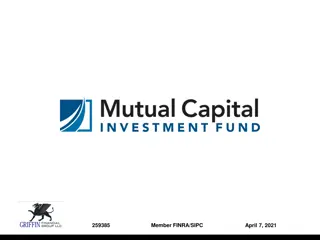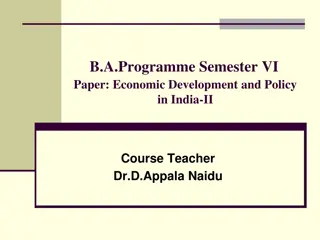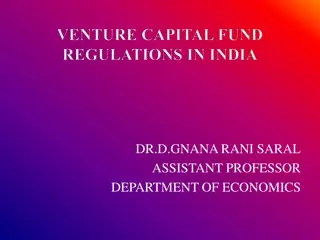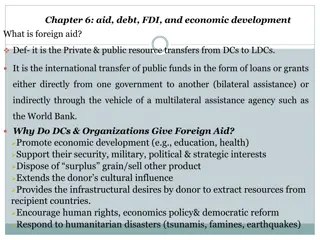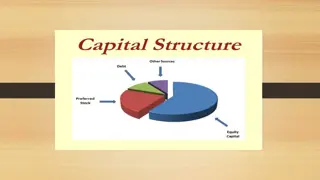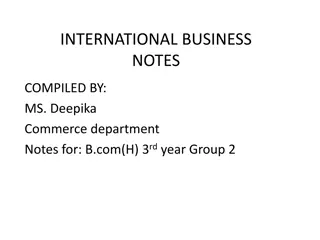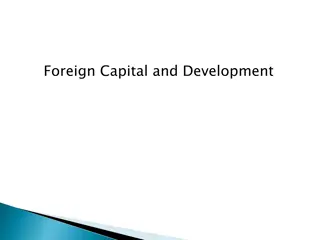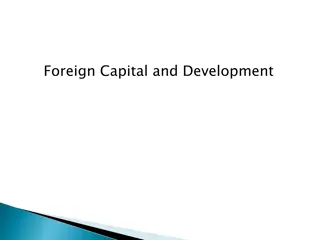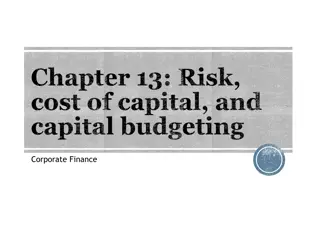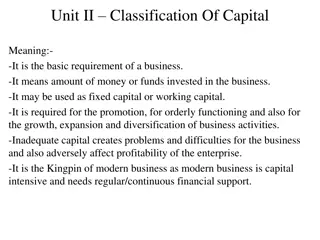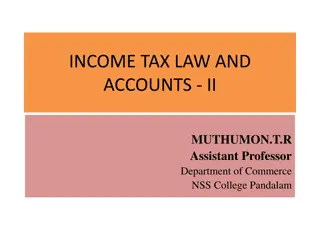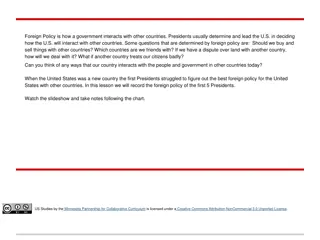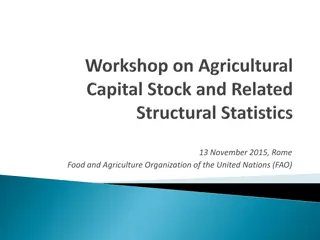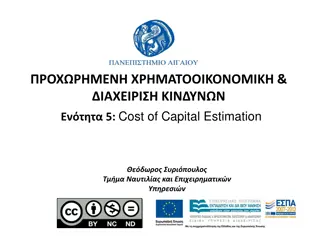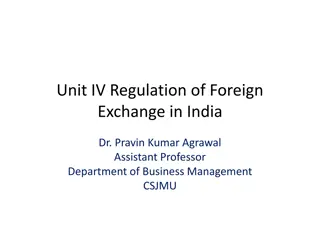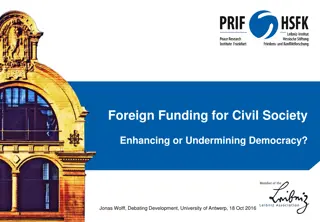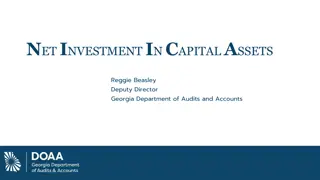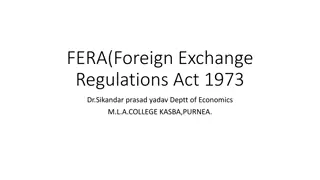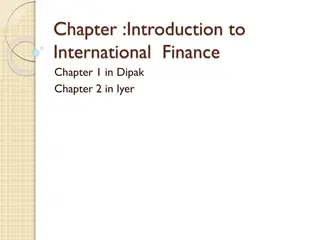CAPITAL STRUCTURE
Capital structure refers to the mix of a firm's capitalization, including debt, preference share capital, equity share capital, and retained earnings. Choosing the right components of capital is crucial based on the organization's function and risk level. Different patterns/forms of capital structur
1 views • 6 slides
Theories of Capital Structure and their Applications
The theories of capital structure explore the relationship between debt and equity in a firm's financing decisions. By optimizing the mix of debt and equity, a company can minimize its cost of capital and maximize its value. The Net Income Approach highlights the benefits of using debt to lower the
1 views • 7 slides
Factors Influencing Economic Growth: Human Capital and Capital Goods
Factors such as investment in human capital, capital goods, natural resources, and entrepreneurship play a crucial role in determining a country's economic growth. Human capital encompasses the skills and abilities of workers, while capital goods are the tools and equipment used to produce goods and
2 views • 28 slides
Understanding Foreign Capital and Its Role in Economic Development
Governments worldwide strive to attract foreign capital to bridge the gap between domestic savings and planned investments, especially in developing countries like India. Foreign capital inflows, including FDI and loans, play a crucial role in driving economic growth and development. Different types
3 views • 4 slides
Challenges in Multinational Capital Budgeting
Multinational Capital Budgeting extends the domestic analysis to evaluate foreign projects, focusing on cash flows, risk adjustments, and real option analysis. It involves complexities such as distinguishing parent cash flows from project cash flows, dealing with differing tax systems, political con
3 views • 15 slides
Aditya Birla Capital Scholarship for Classes 1 to 8.
The Aditya Birla Capital Scholarship is run by the Aditya Birla Capital Foundation and is designed to help students in Classes 1 to 12 and undergraduates with financial aid for their education. The program provides a one-time scholarship of up to INR 60,000 to cover academic expenses. \nTo Know More
0 views • 5 slides
Foreign Investments in India: Legal Framework and Investment Routes
Key statutes applicable for foreign investors in India include FEMA, SEBI regulations, and legislations governing securities markets. Foreign investments avenues in India include FDI, FVCI, FPI, NRI investments through SEBI approval or automatic approval route. Foreign Portfolio Investors (FPIs) and
1 views • 54 slides
Anesthetic Management of Bronchoscopy for Airway Foreign Body
This article discusses the anesthetic management of bronchoscopy for airway foreign body, including presentation, preoperative work-up, intraoperative management, and postoperative care. It highlights the incidence of foreign body inhalation, immediate and delayed presentations, findings on chest X-
2 views • 32 slides
Mutual Capital Investment Fund: Addressing Capital Needs in the Insurance Community
Mutual Capital Investment Fund, LLC, aims to provide capital to mutual insurance companies facing capital needs without converting to stock form or selling minority interests. Led by Mutual Capital Group, the Fund seeks commitments up to $100 million and offers a unique investment opportunity for mu
0 views • 8 slides
Economic Development and Foreign Trade Policies in India
The economic development and policy in India with a focus on foreign trade policies are discussed in this paper. It covers the historical phases of India's trade policy, objectives, and the impact of economic development on foreign trade. The paper also delves into the various theories of foreign tr
0 views • 14 slides
Insights into India's Venture Capital Industry Growth and Potential
Explore the growth and challenges of the Indian Venture Capital industry, including the role of SEBI regulations, investment routes, organization structures for VCFs, and the country's potential in commercializing research and scientific knowledge. Discover the significant increase in registered Ven
0 views • 25 slides
Understanding Foreign Aid, Debt, FDI, and Economic Development
Foreign aid refers to the transfer of resources from developed countries to less developed countries to promote economic development, support security interests, and address humanitarian needs. Donors give aid for political and economic reasons, with foreign exchange constraints playing a significan
1 views • 31 slides
Features of an Appropriate Capital Structure and Optimum Capital Structure
While developing a suitable capital structure, the financial manager aims to maximize the long-term market price of equity shares. An appropriate capital structure should focus on maximizing returns to shareholders, minimizing financial insolvency risk, maintaining flexibility, ensuring the company
3 views • 5 slides
Accounting for Foreign Branches: Converting Trial Balances and Exchange Rates
A foreign branch maintains its accounts in a foreign currency, requiring the head office to convert the trial balance into its own currency before finalizing accounts. Fixed and fluctuating exchange rates impact the conversion process, with specific rules for fixed assets, liabilities, and current a
0 views • 7 slides
Understanding International Financial Environment and Foreign Exchange Markets
The international financial system encompasses the management and trading of international money and monetary assets. This involves transactions in foreign currency, foreign deposits, investments, and assets. The foreign exchange market facilitates the exchange of currencies, determining exchange ra
0 views • 20 slides
Understanding Foreign Capital and Its Implications on Development
Foreign capital plays a significant role in the development of a country through investments from foreign governments, institutions, and individuals. It encompasses various forms such as foreign aid, commercial borrowings, and investments that contribute to capital formation, technology utilization,
0 views • 19 slides
Selection and Appointment of Foreign Sales Agents: A Comprehensive Guide
Learn about the process of selecting and appointing foreign sales agents in international marketing, including the meaning of agency, content of foreign sales agency contracts, reasons for appointing agents, factors influencing agent selection, as well as the advantages and disadvantages of working
1 views • 12 slides
Understanding Foreign Capital and Its Impact on Development
Foreign capital encompasses investments from foreign governments, private individuals, and international organizations in a country, including aid, commercial borrowings, and foreign investments. It plays a crucial role in capital formation, technology utilization, and development across various sec
0 views • 19 slides
Understanding Risk, Cost of Capital, and Capital Budgeting in Corporate Finance
Explore the concepts of risk, cost of capital, and capital budgeting in corporate finance, including the Capital Asset Pricing Model (CAPM), cost of equity, beta estimation, and cost of capital. Learn how to reduce the cost of capital and understand the impact of reducing the Weighted Average Cost o
0 views • 20 slides
Understanding the Classification and Importance of Capital in Business
Capital is crucial for businesses, whether for promotion, functioning, growth, or expansion. It can be classified as promotional, long-term, short-term, or development capital. Factors influencing capital requirements include business activity, size, product nature, technology, business cycle, and l
2 views • 13 slides
Capital Gains and Assets Overview in Income Tax Law and Accounts
This content provides an overview of capital gains and assets in income tax law and accounts, covering topics such as types of capital assets, assets not considered capital assets, kinds of capital assets (short-term and long-term), transfer year of chargeability, computation of capital gains, and c
0 views • 15 slides
Fiscal Year 2022 Capital Budget Presentation Overview
In the presentation to the Board of Finance, the Capital Committee outlines the Fiscal Year 2022 draft capital budget, emphasizing the importance of the Capital Improvement Program and the history of the capital program investments. The proposed budget addresses the critical need for reinvestment in
0 views • 11 slides
Analysis of Henry VIII's Foreign Policy Success and Failure
An overview of Henry VIII's foreign policy up to 1547, discussing the shift in his approach during the 1530s and the revival of ambitions in the 1540s. The content explores traditional and revisionist views on Henry's foreign affairs, including his involvement in Scotland and France, alliances with
0 views • 34 slides
Best Foreign Currency Exchange in Tanglin
If you\u2019re looking for a Foreign Currency Exchange in Tanglin, contact Classic Exchange. Their foreign currency exchange company provides reliable, efficient, and competitive foreign exchange services tailored to meet the diverse needs of travele
0 views • 6 slides
Understanding Foreign Policy: The First Five US Presidents
Foreign policy is crucial in how a government interacts with other countries. The first five US Presidents - George Washington, John Adams, Thomas Jefferson, James Madison, and James Monroe - faced challenges in determining the country's foreign policy, dealing with issues like neutrality, isolation
0 views • 28 slides
Development of Methodologically Robust Agricultural Capital Stock Statistics by FAO
In November 2015, the Food and Agriculture Organization of the United Nations (FAO) initiated a project to enhance Agricultural Capital Stock statistics, focusing on inclusive and efficient agricultural and food systems. The project involves developing methodologies for measuring capital stock and m
0 views • 38 slides
Estimating the Cost of Capital in Corporate Finance
Explore the process of estimating the cost of capital essential for discounted cash flows models in corporate finance. Learn how to determine the cost of debt, equity capital, and the Weighted Average Cost of Capital (WACC) by combining different sources of financing. Gain insights into capital stru
0 views • 59 slides
Foreign-Owned Enterprises (FOEs) in the South Bay
Foreign-Owned Enterprises (FOEs) play a significant role in the South Bay region, contributing substantially to its economy. Foreign firms from developed nations like Japan, UK, and Germany have a strong presence in the area. The concentration of FOEs in cities correlates with improved performance.
0 views • 18 slides
Understanding Foreign Exchange Markets and Risks
Financial managers need to grasp the operations of foreign exchange markets for global business success. These markets allow participants to trade currencies, raise capital, transfer risk, and speculate on currency values. Transactions expose businesses to foreign exchange risk, where fluctuations i
0 views • 40 slides
Foreign Exchange Regulations in India: FERA and FEMA Overview
The Foreign Exchange Regulations in India are governed by acts like FERA and FEMA, aimed at regulating, controlling, and ensuring proper utilization of foreign exchange to promote economic development. FERA, enacted in 1973, was later replaced by FEMA in 2000 to facilitate external trade, payments,
0 views • 42 slides
Foreign Funding for Civil Society: Enhancing or Undermining Democracy?
The discussion revolves around the impact of foreign funding on civil society organizations (CSOs) and democracy. It explores legal restrictions, political targeting, and the trend of limiting foreign funding in approximately 50 countries since 2000. Various case studies from Bolivia, Egypt, Ethiopi
0 views • 10 slides
Challenges Faced in Prioritizing Foreign Language Education
Throughout Europe, foreign language education is emphasized early on in schools, with a high percentage of nations focusing on language learning. In contrast, the United States lags behind in prioritizing foreign language programs in K-12 education, influenced by cultural factors and a lack of aware
0 views • 16 slides
Understanding Net Investment in Capital Assets and Its Importance
Net Investment in Capital Assets is a critical component of an entity's financial position, reflecting the value of capital assets owned. It represents the portion of the net position that is not spendable as it is invested in assets. Calculating Net Investment in Capital Assets involves subtracting
1 views • 17 slides
Understanding Venture Capital: Key Concepts and Regulations
Venture capital is a form of financing provided to startup companies with high growth potential. It involves high risk and requires a long-term horizon, often coming in various forms like equity, conditional loans, and participation in management. The process includes stages such as seed capital, ex
0 views • 10 slides
Understanding Capital Adequacy Ratio (CAR) in Banking
Capital Adequacy Ratio (CAR) is a crucial metric in banking that measures a bank's capital against its risk. Also known as CRAR, it enhances depositor protection and financial system stability worldwide. The CAR formula involves dividing a bank's capital by its risk-weighted assets, comprising tier
0 views • 7 slides
Overview of Foreign Exchange Regulations Act 1973 in India
The Foreign Exchange Regulations Act (FERA) of 1973 in India imposed strict regulations on foreign exchange transactions, payments, and securities dealings. It included restrictions on currency import/export, illegal payments, dealings in foreign exchange, export payments regulated by RBI, bearer se
0 views • 4 slides
Foreign Exchange Management Act, 1999: Overview and Structure
The Foreign Exchange Management Act (FEMA) of 1999 replaced the Foreign Exchange Regulation Act (FERA) and empowers the Reserve Bank of India to regulate foreign exchange transactions. FEMA imposes restrictions on foreign exchange dealings and requires transactions to be conducted through authorized
0 views • 6 slides
Understanding Foreign Aid: Types, Features, and Benefits
Foreign aid encompasses economic, technical, or military assistance from one nation to another, aiming at relief, recovery, or mutual protection. It is not solely monetary, including support in various forms like food aid, education, infrastructure, and health care. Types of foreign aid range from p
0 views • 16 slides
Understanding International Finance: Scope, Importance, and Challenges
International finance explores interactions between countries, including currency exchange rates, foreign direct investment, and risk management. The scope includes foreign exchange markets, MNC financial systems, and international accounting. It raises questions on liberalizing financial markets, I
0 views • 52 slides
Congressional Authority for National Security Surveillance under FISA
The Foreign Intelligence Surveillance Act (FISA) was passed in 1978 in response to abuses outlined in the Church Report. The Foreign Intelligence Surveillance Court (FISC) oversees FISA applications, with the ability for government appeal through the Foreign Intelligence Surveillance Court of Review
0 views • 82 slides








